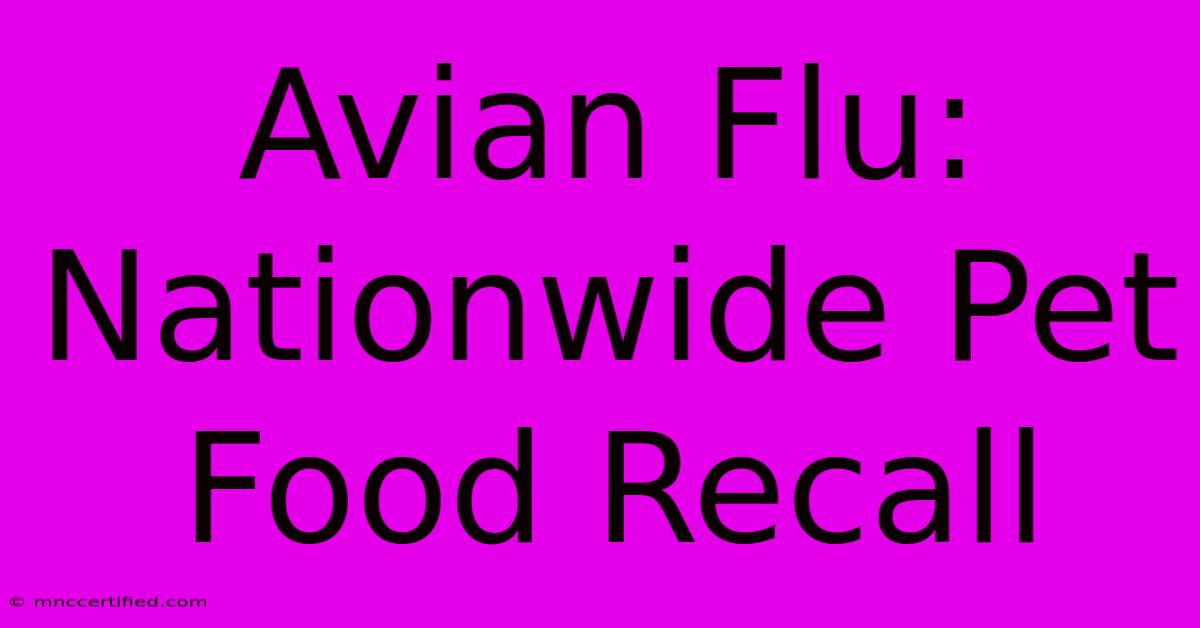Avian Flu: Nationwide Pet Food Recall

Table of Contents
Avian Flu: Nationwide Pet Food Recall - What You Need to Know
The recent surge in avian flu (also known as highly pathogenic avian influenza or HPAI) has sent ripples across the poultry industry and, worryingly, into the pet food sector. This has resulted in several nationwide pet food recalls, leaving pet owners scrambling for information and safe alternatives. Understanding the risks, the recalls themselves, and how to protect your pets is crucial.
Understanding the Avian Flu Threat to Pet Food
Avian flu is a highly contagious viral disease primarily affecting birds. While the risk of humans contracting the virus from pet food is considered low, the impact on pet health is a significant concern. Contaminated feed ingredients, particularly poultry by-products, can harbor the virus, potentially leading to illness in pets who consume them. Symptoms in pets can vary but may include:
- Gastrointestinal issues: Vomiting, diarrhea, loss of appetite
- Respiratory problems: Coughing, sneezing, difficulty breathing
- Neurological signs: Weakness, tremors, seizures
- Sudden death in severe cases
It's crucial to note that not all pet food containing poultry by-products is contaminated. However, the potential for contamination necessitates vigilance and awareness of official recalls.
Identifying Recalled Pet Food Products
The Food and Drug Administration (FDA) and other relevant authorities regularly announce recalls. Checking their websites frequently is essential. Pay close attention to:
- Brand names: The affected brands will be clearly listed in recall announcements.
- Product names: Specific product names and lot numbers are crucial for identification.
- Dates of manufacture and expiration: This helps pinpoint potentially affected batches.
- Retailers: Knowing where the product was purchased can aid in returning it.
Proactive checking of official government websites and the websites of pet food manufacturers is vital for staying informed. Don't rely solely on social media for recall information, as misinformation can spread rapidly.
How to Check for Recalls
- Visit the FDA website: The FDA regularly updates its website with recall information.
- Check the manufacturer's website: Many pet food companies proactively announce recalls on their websites.
- Sign up for recall alerts: Some organizations offer email alerts for pet food recalls.
Protecting Your Pets from Avian Flu Contamination
While recalls are a significant concern, you can take steps to minimize the risk to your pets:
- Buy from reputable sources: Choose pet food from established brands with strong quality control measures.
- Check labels carefully: Examine labels for any recall information or warnings.
- Proper food storage: Store pet food in a cool, dry place, sealed properly to prevent contamination.
- Monitor your pet's health: Be vigilant about any changes in your pet's behavior or health. Contact your veterinarian immediately if you notice any symptoms.
- Practice good hygiene: Wash your hands thoroughly after handling pet food.
The Importance of Responsible Pet Ownership During a Recall
Avian flu outbreaks highlight the importance of responsible pet ownership. Staying informed, being proactive, and acting swiftly in response to recalls are crucial for protecting your pets' health. Remember that quick action can prevent potentially serious consequences. Don't hesitate to contact your veterinarian with any concerns.
This information is for general knowledge and should not be considered a substitute for professional veterinary advice. Always consult your veterinarian for any health concerns related to your pet. Regular checkups and open communication with your vet are invaluable tools for ensuring your pet's well-being.

Thank you for visiting our website wich cover about Avian Flu: Nationwide Pet Food Recall. We hope the information provided has been useful to you. Feel free to contact us if you have any questions or need further assistance. See you next time and dont miss to bookmark.
Featured Posts
-
Urgent Bird Flu Pet Food Recall
Dec 28, 2024
-
Trump Advisers Musk Ramaswamy Rift
Dec 28, 2024
-
Coach Pittman Uses Cane In Liberty Game
Dec 28, 2024
-
Arsenal Vs Ipswich Town Live Score
Dec 28, 2024
-
Chat Gpt Downtime Now Operational
Dec 28, 2024